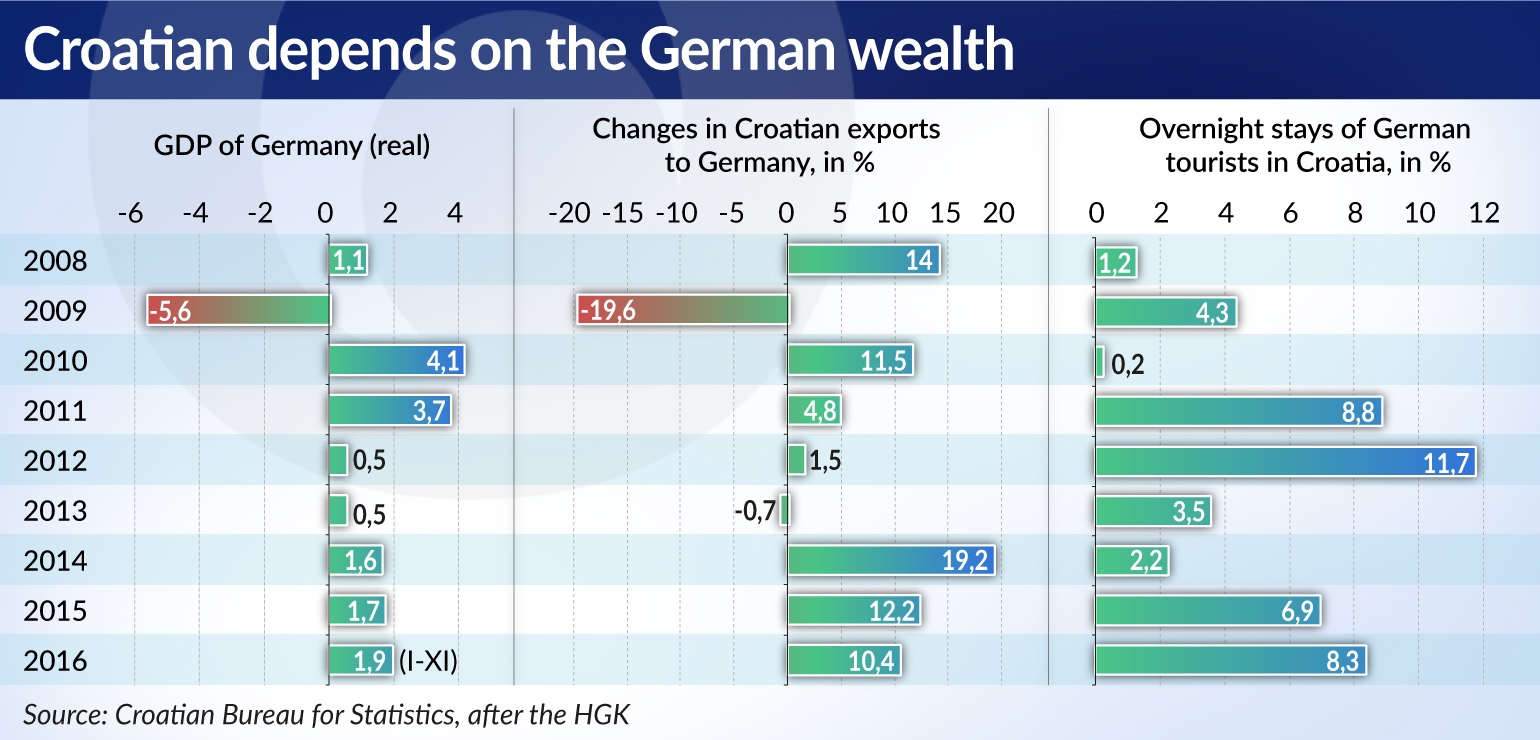Croatian economy is based on two pillars: exports of services and goods. While the first constitutes over half of the Croatian GDP, the second provides an additional quarter. Among the trading partners of Croatia Germany occupies the prominent second place in Croatia exports and the first place in imports. In 2014 the value of Croatian exports to Germany was estimated for USD1.5bn.
The most important goods were machines, metals, furniture, textiles, and footwear and headwear. The import from Germany doubled value of exports and amounted to USD3.36bn. The structure of the exports represented uneven relation of core and (semi)peripheral countries and reminds of Polish-German relation. Semi-manufactured products were sent to Germany (for example, insulated wires, electrical transformers, seats), which in return was selling to Croatia manufactured products (for example computers and cars).
Germany are the most important receiver of Croatian services. Most of the revenue from services is the income from tourism. Guests from Germany for many years have by far the largest groups in the structure of arrivals and overnight stays. From German perspective, in 2015 Croatia was the fifth foreign destination of German tourists, after Spain, Italy, Turkey and Austria.
As observed in the report, although the value and size of exports can be affected by a number of factors, it is Croatian accession to the EU that has had the greatest effect. Gradual reduction of the trade barriers, stabilization of the country and socialization within the EU club quickly brought results.
While in 2008 Croatian export was downgraded to EUR827m, in 2013, the year of Croatian accession to the EU, reached EUR974m and over EUR1.3bn in 2015. However, there is also noticeable correlation between changes in German economy and Croatian exports. When the German economy have declined, the value of exports decreasing. Higher rates of growth of German GDP also led to higher rates of export growth. The same can be said about German touristic visits.
As indicated in the report, it is impossible to observe growth or decline of GDP in Croatia outside the context of developments in major foreign trade partners among which the most important place is occupied by Germany. Exports of goods and services in Croatia accounts for about a third of total, domestic and foreign demand, and significantly determines dynamics of GDP and the state of the economy.
While exports of goods and services to Germany in 2015 accounted for around 11 per cent of total exports of goods and about 21 per cent of total exports of services. Such shares coming to the conclusion that the export of goods and services in Germany, with an upward trend in recent years, accounting for about 5.5 per cent of total demand, or about 16 per cent of the total foreign demand for goods and services from the Croatian.
Subsequently, the authors indicate, that demand from Germany, or exports of goods and services to this country, should increase by about twenty percent, if the GDP of Croatia is to growth by one percent. From the other perspective, one percent growth of Croatian GDP, requires increase of exports to Germany by approximately 55 per cent, while the export of services, mainly tourism, would have to increase by 27 per cent.
Double growth of exports to Germany seems to be difficult to achieve. However, Croatian accession to the EU and uncertainty of tourist destinations in Turkey and North Africa resulted in an average in 2014 and 2015 (data for 2016 is not yet available) annual growth of exports of goods to Germany by 15.7 per cent and average growth in services exports by 11.7 per cent.
Of course, such growth in exports entails a certain increase in imports, which slows down GDP growth and impairs previous calculations, but it does not detract from the conclusion of the great importance of changes in the EU’s largest economy on developments in Croatia. The assumption for the growth of exports of goods and services in Croatia is increasing demand in Germany. However, with regard to seventieth place and a very small share of Croatian exports in German import of only 0.14 per cent, it is not a necessary condition.
Jan Muś is an Assistant Professor at the Vistula University in Warsaw.


